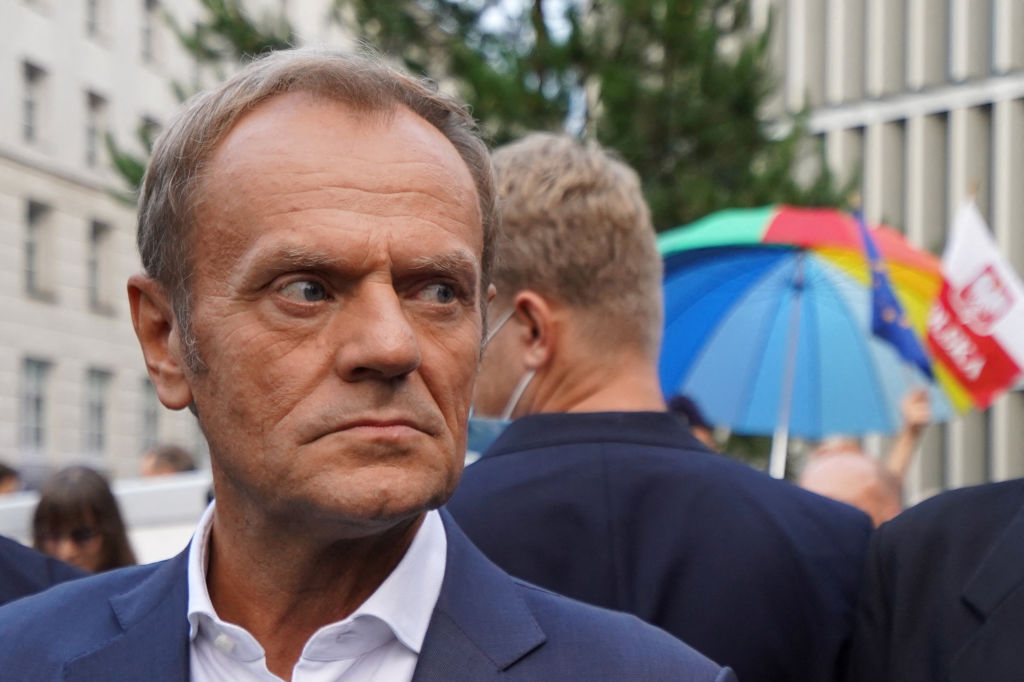‘The British showed that the dictatorship of the Brussels bureaucracy did not suit them and turned around and left.’ That’s the verdict of the parliamentary head of Poland’s ruling Law and Justice (PiS) party, Ryszard Terlecki, who has once again brought discussions of ‘Polexit’ to the foreground of Polish politics. Donald Tusk, Poland’s new leader of the opposition, has responded by suggesting this is party politics at work. But he is making a dangerous mistake to dismiss the prospect of a Polish exit from the EU.
‘If things go the way they are likely to go, we will have to search for drastic solutions,’ said Terlecki on Friday, citing Brexit as an example of a country breaking the mould of EU authority. PiS MP Marek Suski meanwhile compared the EU to 20th-century totalitarian forces: ‘Poland fought against one occupier during World War Two, it then fought against the Soviet occupier, and we are now going to fight the Brussels occupier,’ he said.
This fiery talk was sparked by a request from the European Commission to the European Court of Justice that daily fines be levied against Poland as long as the country fails to follow the ECJ’s orders on legal reforms — in particular, the dismantling of a disciplinary chamber for judges which Brussels says is incompatible with EU law. The bloc’s justice commissioner Didier Reynders has meanwhile made it clear that Poland will not receive money due to it from the EU’s pandemic recovery budget until ‘real change’ is made to the disciplinary chamber.
The Commission’s hard-line stance has come as a shock in Warsaw. The activities of the disciplinary chamber were partially frozen weeks ago; in August, PiS party leader Jaroslaw Kaczynski said the chamber would be disbanded so that ‘the source of the dispute will disappear’.
This wasn’t enough for Brussels. Now, the EU’s refusal to compromise is leading to increasingly hostile rhetoric from more Euroskeptic members of Poland’s ruling United Right coalition. Hawkish justice minister Zbigniew Ziobro — the ruler of the United Poland party propping up the coalition — said the Commission is entering a ‘legal hybrid war‘ with Poland.
This confrontational stance is being encouraged by fellow EU rebel nation Hungary. ‘Brussels attacked Poland,’ exclaimed Hungarian justice minister Judit Varga on Facebook, adding that ‘national justice should not become a victim of Brussels’ empire building.’
Such open hostility towards the European Commission from ministers in EU nations — making explicit use of the language of war and empire — marks a remarkable deterioration in the bloc’s internal cohesion. Donald Tusk isn’t exaggerating when he warns that ‘Poland may cease to be a member of the European Union faster than anyone thinks.’
For Tusk, the specter of ‘Polexit’ is being raised as a result of ‘unnecessary’ government brinksmanship which lacks ideological conviction. ‘Disasters such as Brexit, or the possible exit of Poland from the EU, happen not because someone planned them, but because nobody knew how to plan an alternative,’ he said.
When Tusk returned to Polish politics it looked unlikely that ‘Polexit’ would become a major topic of debate. Polls continue to show a large majority of Poles supporting EU membership: results published earlier this month by the Slovak Institute for Public Affairs showed that Poles are far and away the most pro-EU people of any Visegrád Four nation, with over two-thirds seeing EU membership as a positive for the country.
Such public support for the EU emboldens figures like Tusk to dismiss the government’s increasingly Euroskeptic stance out of hand. ‘Sometimes I have the impression that Poland is ruled by such unbearable brats, who can afford to pronounce every possible political heresy,’ he raged in a TV interview.
But this approach could backfire. By suggesting the Polish government is driven not by ideology, but simply by a wish to watch the world burn, Tusk is trying to invalidate complaints about sovereignty. Brexit shows the danger of doing so.
Portraying the dispute in these terms may be an easy way for Tusk’s struggling Civic Coalition party to score political points against PiS without entering into serious debate over the thornier issues of EU membership. But this ignores the reality that Poland’s issues with Brussels run deep. They touch on a range of delicate questions from the appropriate response of a strongly Catholic country to the LGBT+ culture celebrated in the EU’s western nations, to the implications of EU climate dictates on a country heavily dependent on fossil fuel energy.
Whether Tusk likes it or not, confrontational statements from the government show that a real debate over Poland’s EU membership is slowly emerging. The echoes of Brexit are unmistakeable: a ruling political party shifting towards the ideological standpoint of a small but influential eurosceptic group; an EU intransigent on matters of sovereignty; and a tone of debate becoming more divisive, dismissive, and even downright ugly.
The Polish opposition may feel confident portraying the government’s stance on the current legal dispute as irresponsible given the high regard which many Poles still feel for EU membership. But with discussions of ‘Polexit’ now entering the political mainstream, the time may be coming for a more serious examination of the nation’s commitment to Brussels.
This article was originally published on The Spectator’s UK website.

























